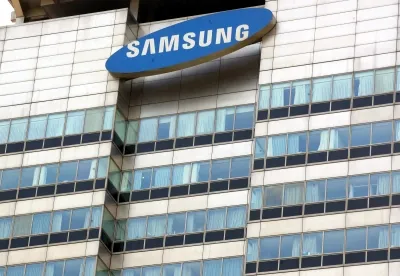Has Foreign Ownership of Samsung Electronics Exceeded 50% Again?

Synopsis
Key Takeaways
- Foreign ownership in Samsung Electronics surpassed 50 percent for the first time since April.
- Foreign investors have significantly increased their purchases this month.
- SK hynix faced a downturn in shares following a downgrade from Goldman Sachs.
- Retail investors showed a preference for SK hynix over Samsung.
- Samsung shares have gained 12.2 percent this month amidst changing foreign investment.
Seoul, July 20 (NationPress) The percentage of foreign ownership in Samsung Electronics has risen back above 50 percent in the South Korean stock market, while retail investors have shown a preference for SK hynix this month, as reported by the main bourse on Sunday.
In the initial three weeks of this month, until Friday, foreign investors acquired a net total of 1.877 trillion won (approximately US$1.34 billion) worth of Samsung Electronics shares, which is more than double the net purchase of 713 billion won recorded for all of last month, according to the Korea Exchange (KRX).
As of Friday, foreign stakeholders owned 50.19 percent of the chip giant, marking a return above this threshold for the first time since April 24, when their ownership was at 50 percent, as reported by Yonhap news agency.
On Thursday, shares of Samsung Electronics experienced a surge after the Supreme Court upheld the acquittal of the company's Chairman Lee Jae-yong, confirming lower court decisions that exonerated him from financial crimes associated with a 2015 merger between Samsung affiliates that solidified his control over the conglomerate.
Conversely, foreign investors sold off 301 billion won worth of SK hynix stocks in the first three weeks, concluding their two-month buying spree in the broader market.
SK hynix shares faced a downturn after Goldman Sachs downgraded the chipmaker from buy to neutral on Thursday, citing the potential for a decrease in high bandwidth memory (HBM) prices next year due to increasing competition.
On Thursday, Samsung's stock rose by 3.09 percent to close at 66,700 won, while SK hynix fell by 8.95 percent to 269,500 won.
As a result of foreign portfolio adjustments, Samsung shares have increased by 12.2 percent so far this month, while SK hynix has seen a decline of 7.9 percent.
In contrast, retail investors adopted a different strategy, acquiring a net of 1.23 trillion won in SK hynix shares while divesting 2.31 trillion won worth of Samsung shares during the same timeframe, according to the report.









